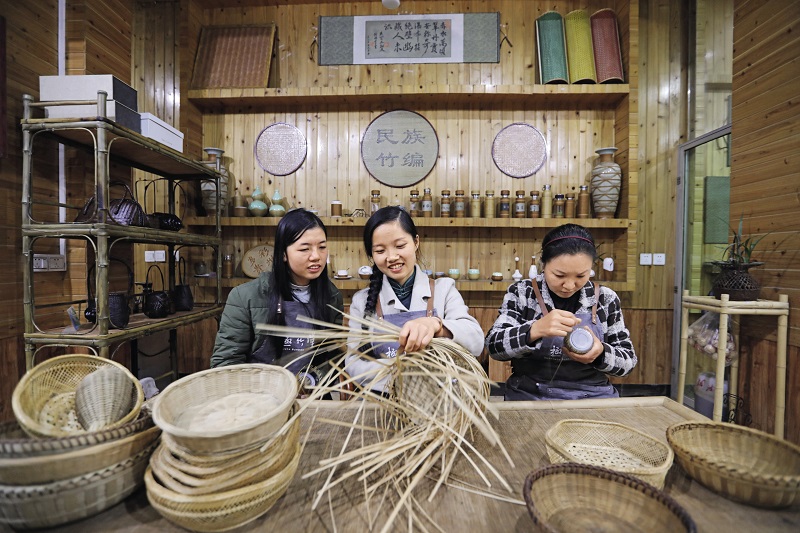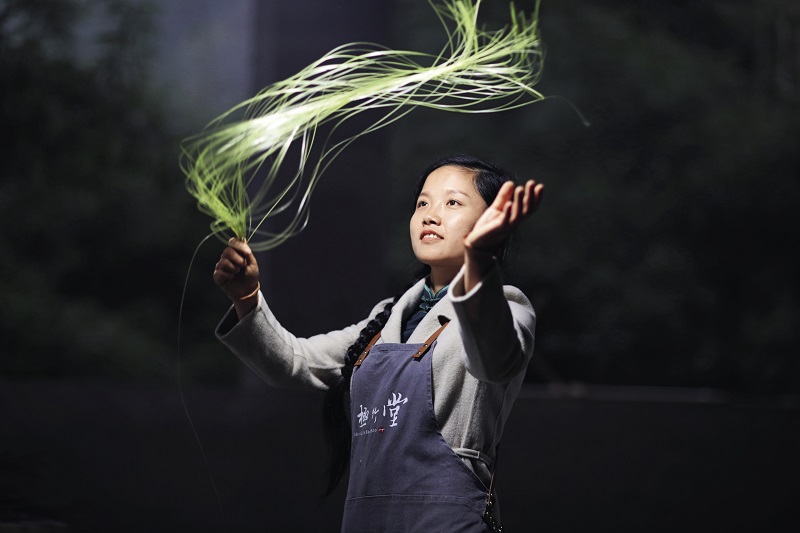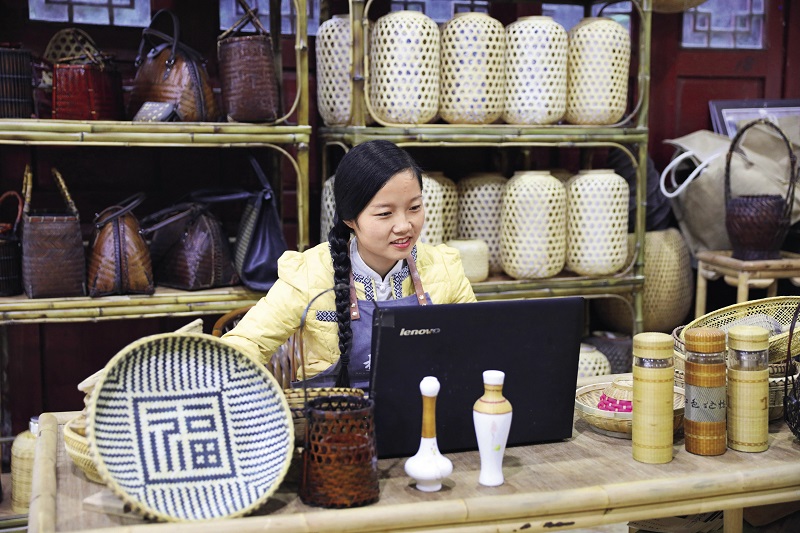Yang Changqin closely integrates intangible cultural heritage with rural revitalization and is innovative in creating methods to rejuvenate the time-honored craft.

Yang Changqin (middle) insturcts students how to do bamboo weaving.
Yang Changqin, a deputy to the National People’s Congress (NPC), is an inheritor of Chishui bamboo weaving, a Guizhou Province intangible cultural heritage. The day before she came to Beijing to attend the annual NPC meeting, part of the Two Sessions, one of the biggest events on the country’s political calendar, Yang had just led employees to complete the first batch of orders this spring. “In the past, our products were mainly sold abroad. Affected by the COVID-19 pandemic, there have been fewer international orders, but we have achieved positive results in the domestic market.”
Yang, 32, closely associates intangible cultural heritage with rural revitalization, and comes up with innovative methods to rejuvenate the time-honored technique, enabling the creative bamboo woven products to go from their remote mountains into the world beyond. The unique bamboo weaving has provided hundreds of locals with jobs and increased the income in Yang’s home base.
From Layman to Inheritor
At 17, Yang graduated from a school training kindergarten teachers in 2007. She had the choice of working in a public kindergarten, or entering an institution of higher learning for further study. Because she had liked traditional bamboo weaving during her internship, she decided to leave her home in Yinjiang County to head for Chishui City and learn more about the bamboo weaving.
The road to learning artistic skills was not easy, but being persistent, Yang continued to master her bamboo weaving skills over the following several years. Her work has gone on to win dozens of handicraft awards. Yang eventually was recognized as an inheritor of Chishui Bamboo Weaving in Guizhou Province by virtue of her superb skills.
In 2012, Yang established her own bamboo weaving craft factory in Datong Town, Chishui City. Many poor women who were left at home after their husbands migrated to other regions in search of work became the first batch of workers in Yang’s factory. Following market demand, Yang led her team to develop thousands of woven bamboo products such as bags, teacups, flower baskets, calligraphy, and paintings, all of which sell well domestically and internationally via channels such as exhibitions and e-commerce platforms. “Only by integrating intangible cultural heritage items into the lives of ordinary people and creating value through innovation can old skills be better protected and inherited,” said Yang, hoping that the traditional skills can be rejuvenated by the hands of young craftsmen.
Chishui is famous for its bamboo resources. The existing bamboo forest there covers an area of about 90,000 hectares, and 200,000 people are engaged in related industrial activities. The bamboo industry and bamboo economy have become an engine for rural revitalization.
“If a piece of bamboo is sold as raw material, it can be sold for up to RMB 10, but after going through more than 20 transformation processes, such as dyeing and weaving, it becomes various handicrafts, and one utensil can be sold for hundreds or thousands of yuan,” said Yang, adding that the bamboo has become a magic wand for locals to increase their income.

Yang Changqin, deputy to the 13th NPC and an inheritor of Chishui bamboo weaving.
New Opportunities
The sudden outbreak of COVID-19 epidemic in early 2020 disrupted the factory’s production and sales plans, and sales in overseas markets stagnated. “There were more than 100 workers waiting for their salaries. Without international orders, I took the lead in exploring the domestic market,” said Yang, who contacted domestic sales platforms to promote her products. On one occasion she said she drove for more than 300 kilometers to the provincial capital Guiyang to bring boxes of goods to an e-commerce company. The company boss took all the boxes after checking the high quality of the goods, which gave Yang great motivation and encouragement.
After her first successful experience of distributing goods, Yang and her staff placed the products on major domestic e-commerce platforms and at exhibitions across the country. They participated in more than 50 exhibitions annually, which generated many offline orders. “We support ourselves by selling products domestically and have achieved good sales performance for several years in a row,” Yang said, adding, “we can sell millions of yuan annually on a single e-commerce platform.”

Yang Changqin marketing bamboo products online. Photos by Wang Changyu
Pursuit of Happiness
In the Chishui Bamboo Weaving Intangible Cultural Heritage Experience Center founded by Yang, there are more than 300 varieties of handicrafts, and the products have been sold to France, the U.K. and other countries, as well as other parts of China including Taiwan and Hong Kong.
Yang was elected as a deputy to the 13th NPC in 2018, because of her outstanding leading role in the inheritance and protection of bamboo weaving and helping locals to achieve prosperity. The first time she attended the annual NPC session, she was interviewed by reporters and shared with them traditional bamboo weaving from her hometown. “Introducing the skill as an NPC deputy is not only an affirmation of the inheritance and protection of bamboo weaving, but also a great encouragement to our craftsmen who have been sticking to it all the year round,” said Yang.
In 2021, the time-honored craftsmanship received 70 million views on TikTok, and China’s bamboo weaving attracted unprecedented attention from overseas netizens.
“The popularity of bamboo weaving abroad proves that this traditional skill is deeply loved. We should develop more products suitable for the international market and create greater value,” said Yang. In order to popularize the heritage, Yang engaged in advanced studies at the Shanghai Academy of Fine Arts and the Academy of Arts & Design of Tsinghua University. She applied new knowledge and skills to three-dimensional bamboo weaving, and innovatively launched a series of bamboo handicrafts, which proved popular with young consumers.
For intangible cultural heritage protection and inheritance, including bamboo weaving, Yang believes that many unique traditional crafts and products lack branding strategy and scale effects. She suggested that the establishment of industrial bases, integration of technical resources, improvement of the training system, opening of new marketing channels, as well as the shaping of cultural and creative brands, can open up a larger market and better protect and facilitate inheritance of the craft.
Yang’s company had an output value of nearly RMB 20 million in 2021, and has 34 registered trademarks and 12 invention patents. The company employs more than 100 local villagers and helped 177 households to increase their income. Since 2012, the company has trained more than 10,000 people annually, including rural women, relocated households, people with disabilities, and students,
Nowadays, more and more young people are receiving training at Yang’s research and production base. “Young mothers are doing bamboo weaving here, surrounded by children sleeping in bamboo baskets,” Yang said, and this is the happiness ideal pursued by the villagers.